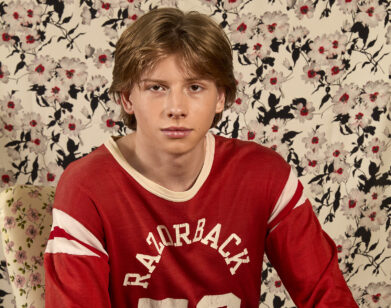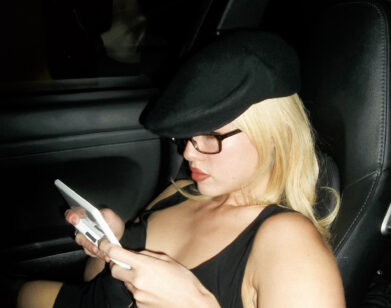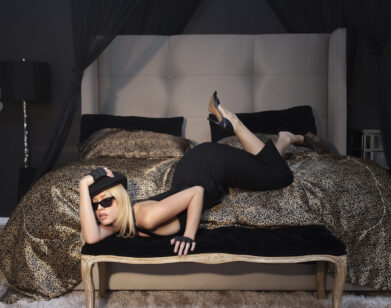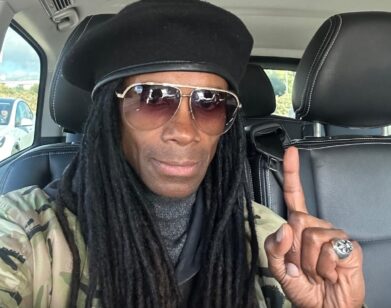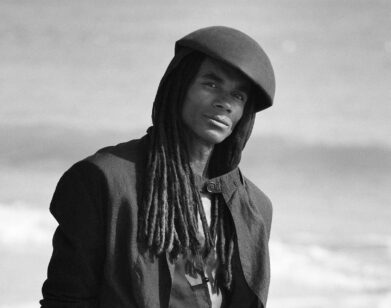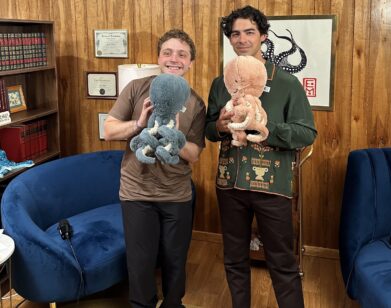Discovery: Solar Year
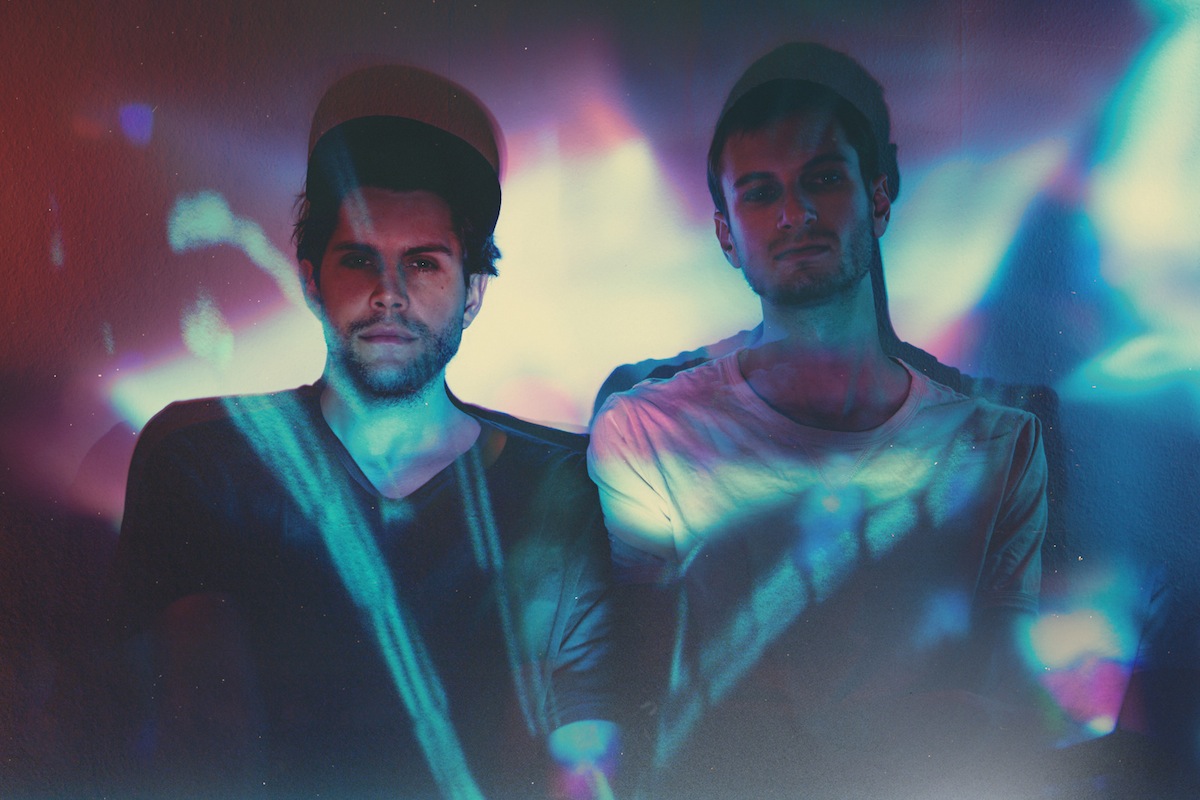
ABOVE: SOLAR YEAR
Ben Borden and David Ertel make electronic pop under the name Solar Year. The Montreal-based duo appeared last summer with the song “Brotherhood”—a woozy piece of electronic music that featured friend and fellow Montreal-based artist Grimes contributing backing vocals. Since then, the band has finished recording its full-length LP, Waverly, the 10 tracks of which mix reverb-soaked vocals and spare beats to create otherworldly, often deceptively catchy pop songs.
The two friends originally met in Montreal, where they played in the same scene as experimental pop acts like d’Eon, Braids, Majical Cloudz and, of course, Grimes. For their album, though, Ertel and Borden uprooted and moved to Iceland, where they wrote and recorded in the beautiful Lutheran church that appears on the cover of their record.
Like Grimes, Borden and Ertel obsess over the way they can make human vocals shift, shimmer, and transmute when filtered through machines. Fittingly, considering its recording location, their album has a quasi-religious weight to its sound—though Ertel assures us, “We’re not, like, a medievalist band or something.” Even so, Ertel’s voice, when re-pitched and processed, can come off less like a single human and more like a gathering of Gregorian monks or an occult hymn sung by a roomful of acolytes.
On the eve of the album’s release, Interview caught up with Borden and Ertel at a Williamsburg, Brooklyn café. (Borden ordered the quinoa and wild rice salad; Ertel had already eaten). Read on for the interview that follows, along with the premiere of album bonus track, “Pivots.”
HOMETOWN: Montreal, Canada
INTRODUCTIONS: David Ertel: Do you know the band Blue Hawaii? The guy, Alex Cowan linked us up. Ben was doing a performance at this weird kind of DIY space in Montreal.
Ben Borden: Abandoned building. In the basement of this abandoned building…
Ertel: …In the basement of this cool show, and he wanted a cellist to work with.
Borden: I was making noise music at that time, and Alex was like, “Have you ever met David? You guys are kind of on the same page.” David was doing live electronics with cello and AutoTune and all this crazy stuff. He showed me a video, actually, of David playing. David was also making these amazing videos at that point. So we were like, let’s jam and see what happens. It was in the basement of this building, so people were spray-painting everywhere. Everyone was getting high and headachy.
Ertel: There was some mold happening, too.
Borden: It was cavernous, pitch-black, with amazing reverb.
GRIMES: Borden: Our first show as Solar Year was at her apartment.
Ertel: Yeah, actually it was. That was the first time we played in front of everybody. She put on a little show. It was supposed to be a series, but it happened like twice.
THE MONTREAL SCENE: Borden: We are definitely part of that scene. [When we started], I don’t think Montreal was really quite as electronic as it is at this moment. It’s just recently that people are going all the way with the electronic things. It was still a rock music world out there.
Ertel: But that was exciting. It was around that time we played that show [with Grimes]. And there was this DIY space Lab Synthèse that was run by Sebastian Cowan, who founded Arbutus Records.
Borden: But we never played there. It kind of ended before we were playing shows.
Ertel: We played there individually, though. You’d get booked for a show, see the lineup, listen to all these artists, and see that this was really a coherent thing. There’s all these artists that are all friends and have kind of a similar vibe—usually laptop artists.
Borden: It was still really experimental at that time, though. Everyone who is now very pop was very experimental at that time. Even Blue Hawaii and Grimes were very experimental, with a few pop songs. It was just supportive, though, the ability to play around with your sound. It wasn’t like “Okay, A&R people are here, so we have to have our single.” It was never, ever like that.
DANCE MUSIC: Borden: We did start moving toward a more beat-oriented direction when we started playing loft parties that were really late night. They were hospitable to more ambient stuff, but needed a pulse. Which is cool, that you go to a loft party in Montreal, and the music’s not trap music. Like last New Year’s Eve, we went to the loft party, and it was all incredibly weird, kind of industrial electronic stuff. That’s refreshing, honestly. Coming here, I do like the bass music scene, but it does feel like you’ve heard the same sort of thing. It is easier to dance to, though.
“SPIRITUAL” SOUNDS: Ertel: The way Ben and I work is that we go back and forth. One person makes a sound and the other person will respond. It’s a little bit automatic, in a way. I think what may have really triggered the spiritual mood is that we use so many vocal samples. Depending on how those are used, they can evoke a religious choir and so many other vocal traditions and ways of singing.
Borden: There’s a church in Montreal that has this ’70s, concrete, almost spaceship church aesthetic. I like that mixture of futuristic, modern, spiritual, human, and organic. That’s definitely a part of our music.
Ertel: We did a big chunk of our album in the church [in Iceland] that’s pictured on our record. Actually, what I liked about that space was that it didn’t feel too religious. It felt somewhere between an art gallery, an office building, and a church. The walls are drywall, the lights are fluorescent tube lights; it didn’t have that traditional church feel. It’s a very modern building. While we might be into spiritual music as an influence, we feel really rooted in the present.
ON RELIGION: Borden: I mean as far as religious stuff goes, though, I think it’s interesting at the point of religion where everyone is together feeling a certain emotion. But the part of religion I don’t like, and we both don’t like, is that gloom-and-doom aspect of religion. The “you’re bad” aspect. The guilt-complex things. But there’s something interesting about it when there’s a bunch of people focused on one feeling or emotion. And that doesn’t have to be a religious thing. A rave is the exact same thing.
ON RECORDING IN ICELAND: Ertel: We applied for this artist residency in the north of Iceland, and we got in. Normally, there’s a normal art-studio area on the water facing the Greenland Sea, as beautiful as that sounds. But we had also heard rumors that there was this music group that came one year before and used this nicer space. We asked if we could use the church and they were like, “Yeah, totally.” They just gave us the keys. We had the whole place for a month; it was ours.
Borden: Part of the residency was that we had to do a community project, so we worked with an elementary school children’s choir. They came every day to the church for music class. So that was really fun. We’d just buy a ton of candy and work on crazy choral experiments. Not like “indie rock children’s choir,” more like them screaming. [laughs] That was a big part of the residency.
ON ENYA: Borden: I had a really amazing English teacher, and she was the biggest New Age hippie with the big glasses and the muumuu. She took us on a glass field trip to a labyrinth where they draw a maze on the floor and you sort of work your way out of it. And she put Enya on. Everyone was like, “This is so cheesy.” But then as I was doing the maze it really clicked. My adolescent hormones kicked in, and I couldn’t stop crying. It was this deeply emotional experience… I don’t know if I want that out there in the world, to be honest. [laughs]
WAVERLY IS OUT TOMORROW VIA CEREMONY. FOR MORE ON THE BAND, VISIT SOLAR YEAR’S FACEBOOK PAGE. YOU CAN PRE-ORDER THEIR ALBUM ON iTUNES HERE.

